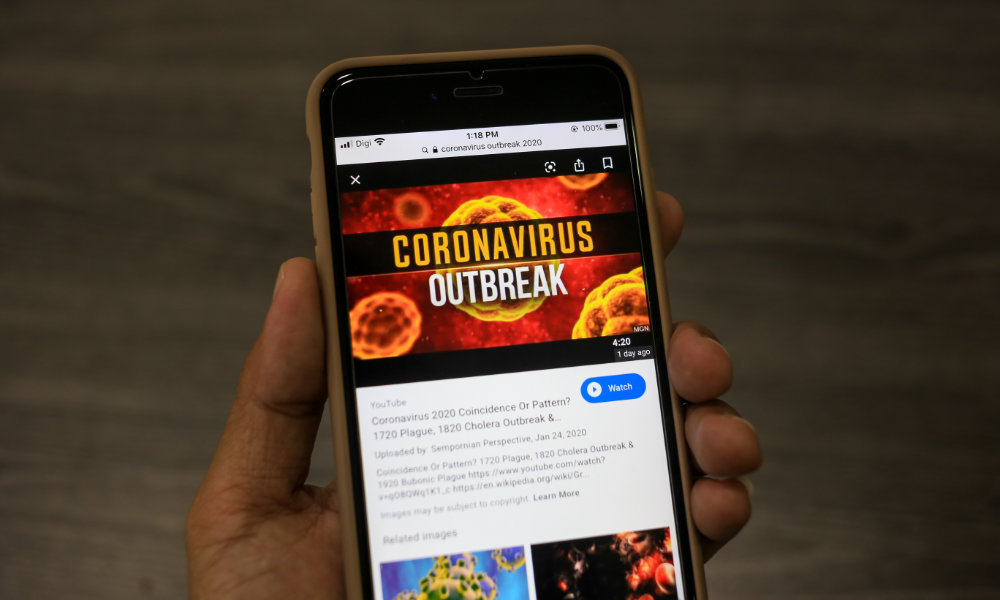Apple Is Taking a Hard Line on Coronavirus Apps
 Credit: Tanak Dusun / Shutterstock
Credit: Tanak Dusun / ShutterstockToggle Dark Mode
In order to stem the potential spread of misinformation regarding the COVID-19 coronavirus outbreak, Apple is taking an uncompromising approach in cracking down on apps that are in any way related to the outbreak.
According to CNBC, Apple has quietly instituted a policy banning all apps that purport to provide information on the coronavirus that aren’t from recognized institutions such as government organizations or hospitals.
CNBC spoke with four independent iOS developers, who told them that Apple had summarily rejected their apps, which were designed to allow users to access statistics on which countries have confirmed cases of the COVID-19 coronavirus. Some of these apps, the report notes, sourced their data from reliable organizations like the World Health Organization (WHO), but were still blocked by the App Store review process.
While Apple hasn’t formally announced the new policy, it told the developers in question that “apps with information about current medical information need to be submitted by a recognized institution,” and that “anything related to the coronavirus must be released by an official health organization or government.”
CNBC notes that Apple has been “specifically evaluating coronavirus apps” in order to prevent the spread of misinformation, which is often rampant during a health crisis such as this. Social network sites like Facebook and Twitter have similarly been combating the spread of misinformation with limited success, so it’s understandable how Apple, which already tightly polices the App Store at the best of times, is taking a hard-line approach here to cut off any potential problems before they occur.
Apple’s Challenges
Making sure that apps only come from official organizations seems to be the most reliable way to ensure this, since even third-party apps that currently use legitimate data sources would still have the potential to allow misinformation to creep in, since it would be difficult for Apple to ensure that every app continued to present reliable data and didn’t later choose to change its data source. A blanket ban seems more than reasonable in this case.
Apple is also undoubtedly concerned about less scrupulous developers attempting to profit in some way from the outbreak. Even ad-supported apps that provide health information in this case could be construed as being in bad taste, and there’s no doubt that there are iOS developers out there that would try and create outright scammy apps to make a quick buck off of people’s fear and uncertainty about the virus.
As CNBC reports, Apple’s policy seems to be working, as search results presently show very few apps about the the outbreak in general, and “no obvious spam.” However, there’s also the fear that it could lead to accusations by developers that Apple isn’t playing fairly, as well as restricting access to legitimate apps that could provide more value than what government and health organizations are able to do right now.
In fact, Apple’s original grounds for rejecting the apps were a little bit shaky, since it seemed to be relying on section 5.2.1 of the App Store Review Guidelines, which makes reference to “trademarks, copyrighted works, or patented ideas” and adds that “Apps should be submitted by the person or legal entity that owns or has licensed the intellectual property and other relevant rights.”
In an update to its App Store Review Guidelines earlier this week, the company added a new section 5.1.1.(ix) that mandates that “Apps that provide services in highly-regulated fields (such as banking and financial services, healthcare, and air travel) or that require sensitive user information should be submitted by a legal entity that provides the services, and not by an individual developer.” While this comes a bit closer to Apple’s rational for denying “unofficial” COVID-19 apps, its still a bit shaky, and seems to have more to do with data collection and storage for privacy purposes.
Interestingly, Google already had this covered in the policies for the Google Play store, with a rule for sensitive events that prohibits apps that “capitalize on a natural disaster” by doing things like “lacking sensitivity”, “denying a major tragic event”, or “appearing to profit from a tragic event with no discernible benefit to the victims.” While this wouldn’t rule out well-meaning apps that simply attempt to provide information, it seems that there are few of these available on the Google Play store either, meaning that Google likely isn’t taking a much softer approach, and in fact a search for “COVID-19” on the Google Play Store returns no results at all; instead Google has published a website that lists suggests apps from organizations like the CDC and the Red Cross.
In other words, while Apple is banning COVID-19 apps outright, Google is taking an approach much more typical for the search giant and simply blocking attempts to find any related apps on its own Google Play store, although there are apparently a few available for users who have direct links or otherwise know where to look for them.






